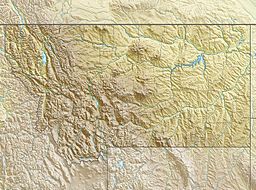Mount Villard facts for kids
Quick facts for kids Mount Villard |
|
|---|---|
| Highest point | |
| Elevation | 12,350 ft (3,760 m) |
| Prominence | 545 ft (166 m) |
| Geography | |
| Location | Park County, Montana, U.S. |
| Parent range | Beartooth Mountains |
| Topo map | USGS Granite Peak |
Mount Villard is a tall mountain located in the Beartooth Mountains in the state of Montana, USA. It stands at about 12,350 feet (3,764 meters) high. This makes it one of the highest peaks in the Beartooth Mountains.
Mount Villard is part of a special protected area called the Absaroka-Beartooth Wilderness. This wilderness area is a place where nature is kept wild and untouched. It is also found right on the edge of two large national forests: Custer National Forest and Gallatin National Forest.
Contents
About Mount Villard
Mount Villard is known for its impressive height. It is a significant landmark in the Beartooth Mountains. These mountains are famous for their rugged beauty and high peaks.
Location and Surroundings
Mount Villard is located in Park County, Montana. This area is in the southern part of Montana. The mountain is surrounded by beautiful natural landscapes.
Hidden Glacier
To the northwest of Mount Villard, you can find a glacier called Hidden Glacier. A glacier is a very large, slow-moving river of ice. Hidden Glacier adds to the wild and icy beauty of the area around Mount Villard.
The Beartooth Mountains
The Beartooth Mountains are a subrange of the Rocky Mountains. They are known for their high plateaus and many lakes. The mountains are a popular spot for outdoor activities.
Absaroka-Beartooth Wilderness
The Absaroka-Beartooth Wilderness is a vast area. It covers over 944,000 acres. This wilderness protects the natural environment. It is a home for many types of wildlife. People can visit to hike, camp, and enjoy nature.
National Forests
Mount Villard sits on the border of Custer National Forest and Gallatin National Forest. These forests are managed by the U.S. Forest Service. They provide habitats for animals and places for people to explore. They also help protect important natural resources.
 | Toni Morrison |
 | Barack Obama |
 | Martin Luther King Jr. |
 | Ralph Bunche |



